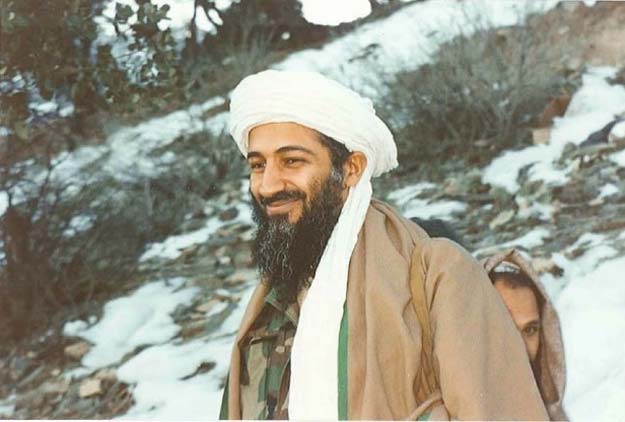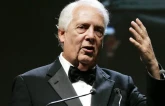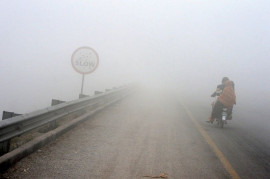
According to current and former US officials, the CIA station chief Mark Kelton was suffering from a mysterious ailment which made him double over in pain.
Kelton, 59, has since recovered after he had abdominal surgery but agency officials still believe that it is plausible, even if it cannot be proven, that his sudden illness was somehow orchestrated by ISI.
Declassified US document suggests Pakistani link to attack on CIA agents
Speaking about the incident, Kelton said the cause of his illness “was never clarified,” adding that he was not the first to suspect he had been poisoned. “The genesis for the thoughts about that didn’t originate with me,” he said.
Kelton declined to answer questions about his illness or his tenure in Pakistan. “I’d rather let that whole sad episode lie,” he said. “I’m very, very proud of the people I worked with who did amazing things for their country at a very difficult time. When the true story is told, the country will be very proud of them.”
Pakistan has since dismissed the allegations against the ISI. “Obviously the story is fictional, not worthy of comment,” said Pakistan Embassy spokesman Nadeem Hotiana. “We reject the insinuations implied in the allegations.”
US officials admitted they never had any prove of the accusation and they did not confront Pakistan over it. According to CIA spokesperson Dean Boyd, privacy considerations “limit what we can say about any individual cases . . . but we have uncovered no evidence that Pakistani authorities poisoned a US official serving in Pakistan.”
Even if the poisoning suspicion is groundless, the idea that the CIA and its station chief considered the ISI capable of such an act suggests Pak-US relations were even worse than initially thought.
Further, current and former US intelligence officials said the ISI has been linked to numerous plots against journalists, diplomats and other perceived adversaries and that the spy agency’s animosity toward Kelton was intense.
Pakistan rejects Afghan claims of ISI involvement in parliament attack
Officials further revealed the ISI chief at the time, Ahmed Shuja Pasha, routinely refused to speak with Kelton or even utter his name, referring to the dour CIA station chief as “the cadaver.”
During Kelton’s seven months in Pakistan, he signed off dozens of drone strikes and he also presided over the final preparations for the raid in Abbottabad that killed bin Laden. The shootout incident involving CIA contractor Raymond Davis in Lahore also occurred within days of Kelton’s arrival.
Bin Laden raid
Kelton, Munter and a senior US military official watched the bin Laden proceedings in a secure CIA room in the embassy. The trio had made secret preparations for possible Pakistani reprisals, officials said, drafting evacuation plans that called for employees at scattered US diplomatic sites to flee across the border into India or be scooped up by the USS Carl Vinson from the Karachi shore. Those at the embassy would have to hunker down.
Kelton was summoned by Pasha one week after bin Laden’s death and expressed his anger at keeping the raid a secret. Soon after, Kelton began to experience stomach pain. At first he thought it was a digestive ailment but as his condition worsened, he left the country several times for treatment.
Some of Kelton’s colleagues, including many in Pakistan, are not convinced that the the ISI would risk Pakistan’s multibillion-dollar dependency on the United States by poisoning a high-ranking US official. They blame his condition on bad food or pressure of the job.
“Stress does funny things to the body,” said one former senior agency official who added that “there is zero evidence” Kelton was poisoned.
Pakistani operative was using MSF hospital in Afghanistan as Taliban command post: report
US officials also revealed that by 2009, CIA had evidence that the ISI was complicit in the terrorist attacks in Mumbai, suspected the ISI of staging raids to disguise the deaths of militants killed in custody and were convinced that the ISI routinely tipped off its proxies when they were about to be struck by CIA drones.
Relations further soured when in 2010 CIA increased its drone campaign and Pasha was named in a Mumbai-attack-related lawsuit in the United States. In turn, a case was filed in Pakistan by alleged victims of a drone strike revealing the name of the CIA’s then-station chief, Jonathan Bank.
Fearing for Bank’s safety, he was removed from the country without any prior notice to Pakistani authorities. He was whisked off in the plane when then-CIA Deputy Director Michael Morell finished a series of scheduled meetings in Islamabad.
Upon his arrival in Pakistan, Kelton stated that the ISI should be treated as a determined foe rather than a problematic partner. Less than 48 hours after landing in the country, the Raymond Davis incident happened. Although Kelton was against it, then-US Ambassador Cameron Munter secured permission to deal with Pasha directly and admit Davis’s ties to the CIA. Davis was released March 16 after a secret court proceeding in which the families of those killed were paid $2.4 million.
The very next day, a CIA drone carried out a strike that killed at least 40 people at a tribal council meeting in Datta Khel. According to US officials, Pasha was furious and considered the assault a “kick in the teeth” after the Davis deal was arranged. Pasha’s relationship with Kelton never recovered, and the two rarely spoke in the ensuing months.
This article originally appeared on Washington Post








1734934759-0/Copy-of-Untitled-(77)1734934759-0-270x192.webp)
1734954745-0/Copy-of-Untitled-(89)1734954745-0-270x192.webp)
1734937565-0/Copy-of-Untitled-(80)1734937565-0-270x192.webp)





1734778885-0/Untitled-(10)1734778885-0-270x192.webp)






COMMENTS (9)
Comments are moderated and generally will be posted if they are on-topic and not abusive.
For more information, please see our Comments FAQ